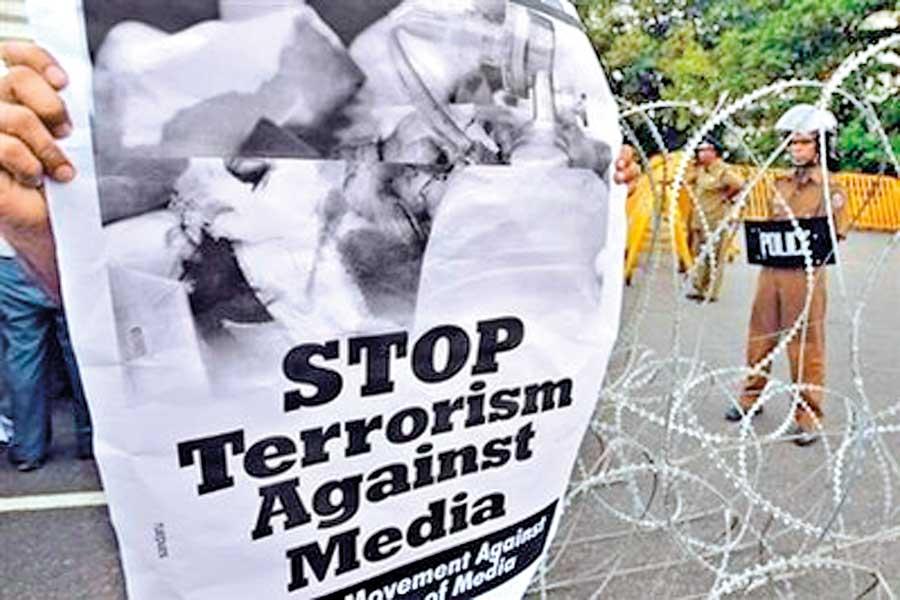Reply To:
Name - Reply Comment
Last Updated : 2024-05-24 20:48:00

Though the state-owned media organizations control print and electronic media in all three languages unlike any other, they have failed miserably to win public trust
Our state-owned media organisations have been abused by successive governments in power for so long that they have completely obliterated the idea of public service media organisations.
organisations.
These organisations are the largest media operators in the country, and they have always been. They control print, radio and TV in all three languages unlike any other. Over-staffed by under-preforming political henchmen and women, they have never had to deal with financial sustainability. Because the governments in power will keep funding their operations.
Thankfully, these dinosaurs have not been able to crack the digital code – they are very unlikely to do so as well.
Sri Lankans have grown to look at these as political propaganda units. They have been used to pump up political personalities and messages and dish out mud on rivals, the public does not see that these behemoths are funded by each and every citizen of Sri Lanka.
These media organisations should be used as public service networks. Given that they are and will for the foreseeable future be at least partly funded by state coffers, they have the freedom to operate without the fear of selling whatever muck that sells. They can be used to create information channels vital for public safety but are low down on the money-making scale.
Sri Lankans have grown to look at these as political propaganda units. They have been used to pump up political personalities and messages and dish out mud on rivals, the public does not see that these behemoths are funded by each and every citizen of Sri Lanka
On the debate of ethical media usage, there will always be click-bait hungry gossip dominated private media that will go for the slapstick. It will not change.
In Sri Lanka, we don’t get to see any alternative to this. The private media is politicised. The message may not be as stark as the state-owned media, but the bias is real. Leading editors and scribes are biased. In the past, they were able to keep the biases well-hidden. Now, taken on by the performative nature of social media and with very little training and skills on digital hygiene, a peek into the social media feeds and the biases scream out.
There is no alternative to this biased, politicised modus operandi. Expecting private media to change is a bet, but a risky one. Individual media professionals can create this, but that depends a lot with the level of independence they are afforded and also, importantly, the level of exposure they get in. It is no use when the politicised rabble rouser’s copy is on P1, loosely sourced but with 40-point red fonts and the professionally reported piece is tucked on the left-hand side page bottom.
The practically easy option is to adopt the state-funded media sector from what it is now – government media to what it really should be – public service media.
Easy to on paper, harder to do real time. The public funded media in Sri Lanka has swayed at extremes, under successive Rajapaksa family led governments they have been in the control of screaming nationalism, tribalism and glorification of a clan. Under other governments they have continued to pump the personality cults and veer towards extremes. Under the Yahapalanaya, the tilt to the extreme left was such that the message was as nauseating as under the Rajapaksa rule. Yellow journalism is not professional journalism, not by any stretch of
the imagination.
In Sri Lanka, we don’t get to see any alternative to this. The private media is politicised. The message may not be as stark as the state-owned media, but the bias is real. Leading editors and scribes are biased. In the past, they were able to keep the biases well-hidden
It is because we have been unashamedly good at the extremists, politicised reporting, that the public does not trust us. Public support for control over media is high because they are used to them as unprofessional political bandicoots.
The Yahapalanaya years, I felt offered a window to infuse some levels of professionalism and public integrity into the state-owned media. But that opportunity was again misused by pseudo-professionals and half-baked experts who all were dancing to a political tune while pretending to be professional.
The other option is to create a media that is funded by public grants and a trust. This too will depend on the level of professional acumen of those who staff them.
It is not that Sri Lanka lacks talent in journalism. Some of the best talent I have seen anywhere in the world will always be my Sri Lankan colleagues. But that talent is not nurtured and not provided with the opportunities to gain the best professional skills. Most of the time skills training, provided by either Sri Lankan or foreign interlocutors is outdated, outmoded and does not fit the circumstances.
When the best talent bleeds away at a steady rate, it is the politicised seat warmers that survive and keep manning the gatekeeper roles.
The writer is a journalism researcher and a PhD candidate. He can be contacted on
amantha.perera@cqumail.com

Add comment
Comments will be edited (grammar, spelling and slang) and authorized at the discretion of Daily Mirror online. The website also has the right not to publish selected comments.
Reply To:
Name - Reply Comment
For a long time, accusations have been made against Urban Development and Hou
The state-run loss-making State Mortgage & Investment Bank (SMIB) has reveale
US authorities are currently reviewing the manifest of every cargo aboard MV
On March 26, a couple arriving from Thailand was arrested with 88 live animal